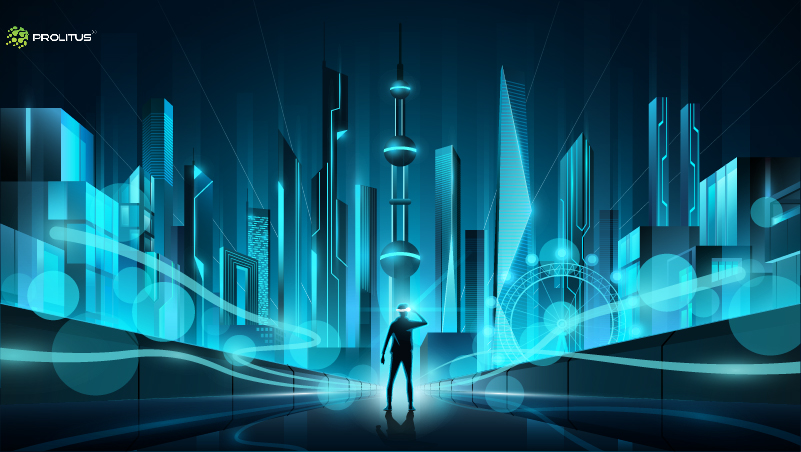In the 21st century, technological advancements have drastically improved various digital world areas. The first decade had a rapid boom in digital communication limited to voice calls and messages. Technological progression gave birth to the Metaverse, leading to exploring possibilities on an entirely different tangent.
The Metaverse enables a 3D world for an immersive digital experience. Imagine yourself sitting at home and still being able to attend your favorite concert virtually. It’s all part of Metaverse technology. It is now all set to reach the masses with its revolutionary technology. Let’s first explore what the Metaverse is, and the technologies involved that helped in its formation.
What is Metaverse?
The Metaverse is a highly immersive internet for users to access AR and VR-based environments and access the offered utilities through their unique avatars and other digital technologies. It is a non-physical world where people can communicate through various forms of virtual technology.
The Metaverse consists of virtual worlds and environments linked to people worldwide. Popular games such as Sandbox, Axie Infinity, and Decentraland have incorporated some aspects of Metaverse to bring multiple elements of our lives online. However, the Metaverse is still under development.
As the Metaverse is in the development phase, it has scope beyond video games and social media platforms. Metaverse technology can offer digital identity, remote working, and decentralized governance. In the near future, Metaverse will offer a more multidimensional environment that will let users physically move around in 3D spaces.
Why are companies focusing on Metaverse?
The entertainment industry is bullish on metaverse technology as it calculates how it will impact its business model. Technology leaders are on the lookout for this emerging technology because it has the potential to drive strategic business innovations for the company.
Metaverse allows people to replicate physical activities in the virtual world. This virtual world is capable of transforming the physical world. Even though they combine a wide range of these activities, they have limited functionality currently.
Businesses should also realize types of content will change with the landscape of the Metaverse. Hence, companies need quality content marketing strategies to progress.
Technologies Behind the Metaverse
Blockchain Technology
Traditional tech companies such as Facebook will be building the centralized metaverses. However, blockchain technology will help replace it with a robust, decentralized infrastructure.
Since blockchain is built on the third iteration of the Internet, i.e., Web 3.0, even metaverse projects need to be made as decentralized platforms. It will not only help to prove ownership and collection but will also facilitate value transfer, govern access, and ensure interoperability. Blockchain technology and cryptocurrencies will help boost users’ ability to exchange value while working and socializing in 3D digital worlds.
Augmented Reality (AR) and Virtual Reality (VR)
Virtual reality and augmented reality are our means of entering the virtual world, providing immersive 3D experiences. Augmented Reality (AR) can be used on digital devices and allows users to view their surroundings through interactive digital imagery. For example, the popular game Pokémon lets users see Pokémon when they open the camera on their phone.
In contrast, virtual reality (VR) creates a virtual environment using lines of code. If you plan to enter the VR world, you will need VR headsets, gloves, and sensors. VR and AR represent early examples of the Metaverse.
Virtual reality helps to create a digital world that allows users to listen, feel, and interact with people worldwide. Soon, virtual reality will also incorporate physical simulations into the metaverse experience.
Artificial Intelligence
Artificial intelligence (AI) replaces human activities with computer-controlled automated actions. Businesses use AI for identity verification, fast computing, analytics, etc. Even in the Metaverse, AI supports the creation of 2D and 3D-based avatars depending on the user.
Artificial Intelligence gives a real-world effect to Avatars and powers them with the ability to learn human body language and conversation style. Since AI makes communication easy on the Metaverse, users who speak different languages can also explore its horizons and utilize its benefits.
3D reconstruction
Although 3D reconstruction has been prevalent for a long time, it found its value during the pandemic when businesses started using 3D reconstruction to generate virtual tours of properties. In the Metaverse, buyers can quickly check out new homes and purchase them without setting foot inside.
A virtual world should also be a complete replica of the real world. The 3D reconstruction enables the creation of realistic and organic-looking spaces. Using unique 3D cameras, we can render accurate 3D models of buildings, locations, and objects on the web. The digital twins are then shown to users in the Metaverse so they can explore them.
IoT-Internet of Things
The Internet of Things acts as a medium to connect the real world with the Internet via sensors and devices. In the Metaverse, IoT establishes a connection between the virtual and real worlds with the help of gadgets. IoT also enhances the accuracy of activities in the virtual world by providing real-time data collected from the real world.
IoT seamlessly connects the 3D world to many real-life devices, enabling the creation of real-time simulations in the Metaverse. When IoT is used with AI and ML, the Metaverse can be optimized and the data can be managed well.
Final Thought
The Metaverse is still in its infancy as tech experts are researching strategies to develop ideas for projects. Soon, new technologies will empower the Metaverse, supporting the development of use cases for real-life functionalities. It will shape the digital future by providing opportunities for enterprises and everyday users.
Prolitus can help you launch your Metaverse Development Platform.
As the Metaverse is gaining attention from everyone, it is the perfect time to take a step toward Metaverse development. Prolitus has an expert team that will help you achieve your business goals by developing a well-designed, high-result yielding, and tailored metaverse development platform with your choice of blockchain network. The experienced and expert team at Prolitus has the tools to build the Metaverse of all your creative and imaginary ideas.
Frequently Asked Questions (FAQs)
Q1. What technology is needed for Metaverse?
Ans. Metaverse combines technologies such as virtual reality, augmented reality, and artificial intelligence to let users enter the virtual world. Each technology plays a vital role in creating a digital world for the users.
Q2. What will be the future of the Metaverse?
Ans. Metaverse will be a game-changer in several sectors by introducing virtual reality (VR) wearables. The gadgets will enable users to enjoy an immersive experience after entering a virtual world from the confines of their homes.
Q3. How could the Metaverse impact the world and the future of technology?
Ans. The future for Metaverse looks bright as it begins to incorporate Web 3.0 technology, driven by blockchain technologies such as Cryptos and NFTs. It will be similar to the real world in several aspects and could even replace real-world activities such as frequent commutes.





